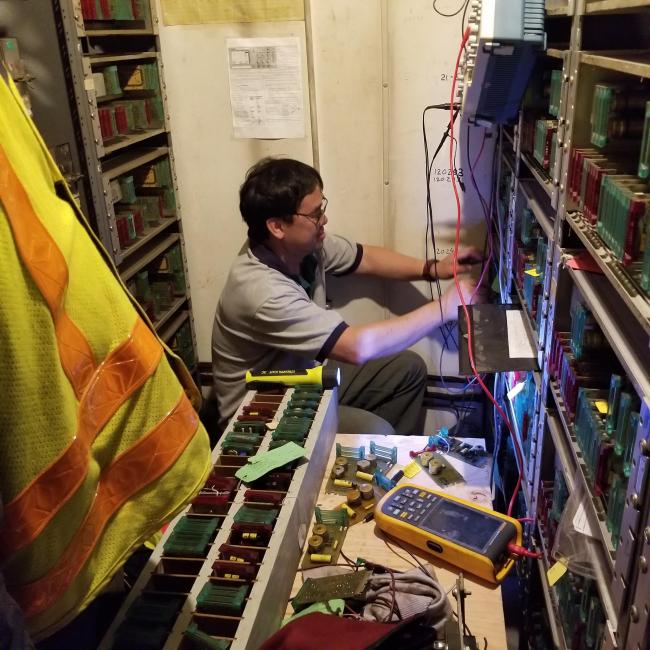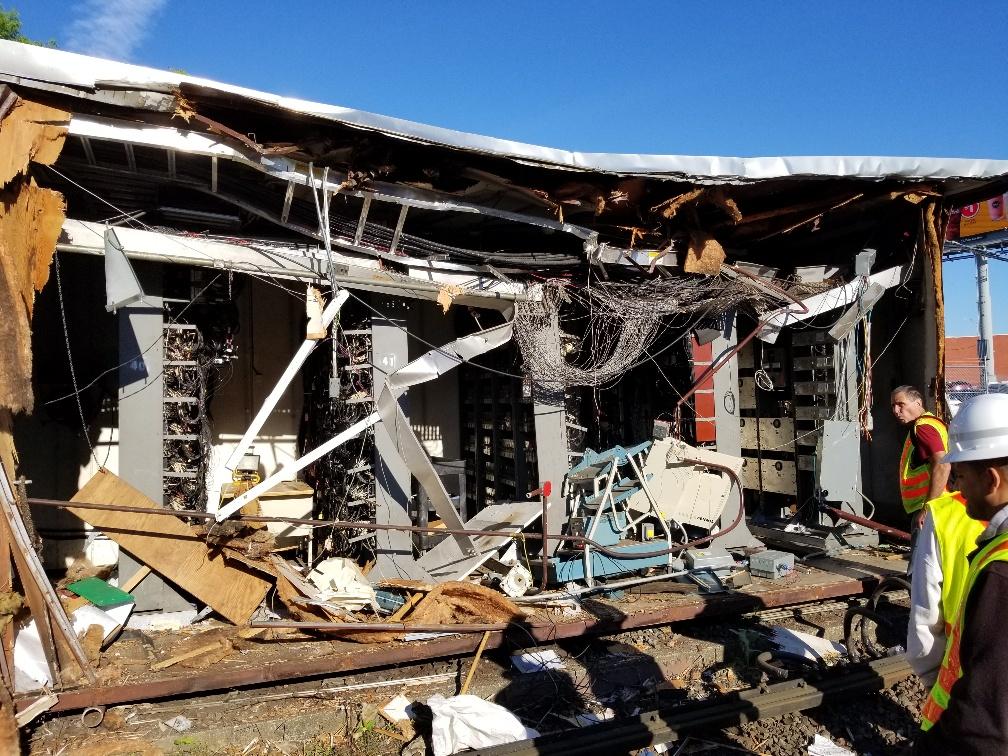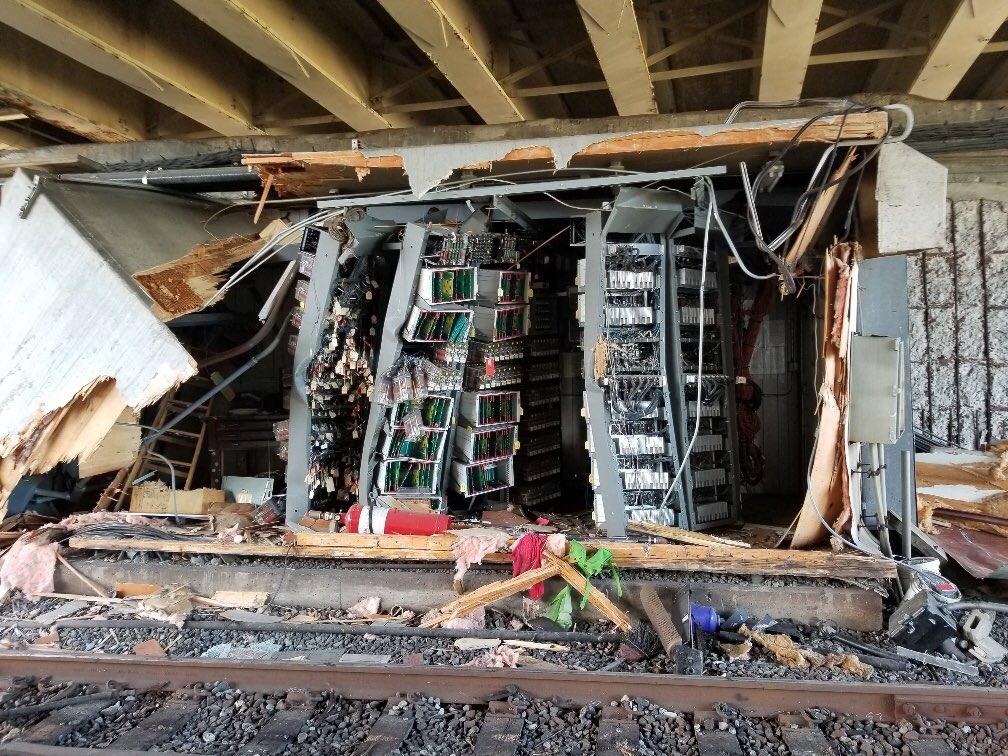Plans to Accelerate Red Line Signal Repairs
Posted on June 21, 2019
The MBTA is currently achieving service levels of a train every 6 minutes during rush hour
Work to repair signal systems to continue through the summer
Today, the MBTA announced an accelerated repair schedule for the Red Line’s signal system.

Following the derailment of June 11, initial recovery efforts were focused on repairs to track and power systems in the area of JFK/UMass Station.
In the immediate aftermath of the June 11 derailment, trains could only run at a rate of approximately one train every 10 minutes, or 6 trains per hour, during peak travel hours through the Red Line core, which spans from JFK/UMass to Alewife.
With both contractor personnel and MBTA forces working around the clock, train speeds could safely increase to 25 miles per hour through most of the affected area. As a result, the MBTA was able to restore Red Line frequency to one train every 6 minutes during rush hour, or about 10 trains per hour.
In order to safely operate trains at 6-minute intervals, while also allowing crews to continue signal-system repairs, Red Line trains are passing through the JFK/UMass area under a carefully controlled manual operation. This complex process involves over 50 people at a given time to safely coordinate the movement of trains between the Red Line core and the Braintree and Ashmont branches.
“While we recognize anything but full service falls short of our customers’ expectations, our current recovery schedule reflects the MBTA’s urgent approach to the massive task of returning the Red Line to full service,” said MBTA General Manager Steve Poftak. “As recovery efforts continue, I want to thank the MBTA workforce for their urgency and professionalism, and I want our customers to know that we deeply appreciate their patience.”
Red Line recovery work is expected to continue through the summer to gradually restore impacted portions of the Red Line to full service.
Signal Restoration
Work remains ongoing to address critical signal infrastructure that will allow the MBTA to resume normal levels of service. After conducting a careful evaluation of remaining work, the MBTA expects that this work will continue throughout the summer.
During the derailment, the train struck and damaged multiple structures that house critical Red Line signal hardware and equipment in the area near JFK/UMass.


This equipment controls the intricate system of track, signals, and switches where the Ashmont and Braintree branches diverge on the Red Line. Without the signal system, each Red Line train must be given permission to proceed from one station to the next with personnel along the tracks physically directing trains’ routing. While this limits train speeds as well as the total number of trains in service, this manual process is necessary to allow trains to move safely along tracks.
In addition to controlling the speed and frequency of Red Line trains traveling in passenger service, the signal system also plays a vital role in dispatching trains during the start of service each day.
MBTA signal and power teams continue to simultaneously assess the scope of damage and make repairs to the signal systems. Because of the age of the system and the extent of the damage, initial restoration of the signal system was projected to take approximately one year.
Working to compress that schedule, teams are focusing on expediting the restoration of the signal system in four separate areas of the Red Line:
- Broadway to JFK/UMass
- Ashmont Branch: JFK/UMass to Fields Corner
- Braintree Branch: JFK/UMass to the track in the area proximate to Tenean Beach
- Cabot Yard in South Boston to JFK/UMass
Beyond efforts to restore the system to full automation, the MBTA is also working to expedite the replacement of the existing analog system to state-of-the-art digital audio frequency technology. Under a contract awarded to Barletta Heavy Division in October 2018, the MBTA is working to re-sequence the installation of the new system with a focus on starting the upgrade project in the area of JFK/UMass.
Restoration Goals
The MBTA will continue working over the coming weeks to restore segments of the signal system with the goal of further improving service levels by Labor Day. Red Line customers are still advised to plan for extra travel times due to manually operated switches that require trains to travel at a slower speed through a certain segment of Red Line track. As signal assets incrementally come back on line, it will lessen the need for manual operations, which in turn, will improve train speeds, allow the MBTA to increase the number of trains in service, and ultimately drive passenger wait times down toward levels that customers expect.
Recovery and Repair Update
The Red Line derailment continues to be under investigation. Operator error (including speed), foul play, and track infrastructure have been ruled out as the probable cause at this time. After disassembling the car that derailed, MBTA personnel are in the process of determining potential causes of its failure through rigorous evaluations of the car’s components. Out of an abundance of caution, the MBTA conducted a rigorous inspection of all related components of all vehicles of the same type involved in the derailment. As of today, Friday, June 21, all vehicles of the same type involved in the derailment have been inspected.
MBTA workers and contractors continue to repair damaged signals, switches, and bungalows in the area impacted by the derailment. This includes the following repairs and updates for:
- Repairing and replacing all damaged third rail (approximately 200 feet), and 200 feet of rail near track switches, which was accomplished last week.
- Wire and cable work continues as quickly as possible.
- Power and signal work is ongoing with necessary repair parts arriving on scene through the week to be assembled.
MBTA and Red Line Investments
The $8 billion that the MBTA plans to spend over the next 5 years is the most in any 5-year period ever—and this funding will have tangible results and provide a more reliable ride for our customers.
The MBTA is investing nearly $2 billion in the Red and Orange Line improvement program, which will completely replace the cars and signal systems, and upgrade track and maintenance facilities, of both lines.
The MBTA is investing $350 million on the signal systems and $470 million for track and maintenance facility upgrades.
The MBTA is working to deliver 252 new Red Line cars and expects the first Red Line pilot car to be delivered this summer.
This is aggressive capital spending to completely update these major lines, and customers are going to see tangible results of these investments in the next couple of years.
The MBTA has also made a number of investments along the Red Line since 2015 including replacing third rail and track, and signal work.
Stay Informed
Updates regarding Red Line service will continue to be available on the MBTA website and on Twitter. For the most up to date service information, visit mbta.com/redlineservice and follow the T on Twitter @MBTA and @MBTA_CR.
Learn More
More Information
Media Contact Information
For all queries and comments, please contact:
Recent News on the T
March 6, 2025
March 4, 2025
March 4, 2025
February 26, 2025